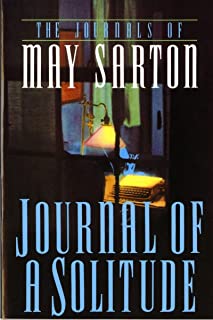- Read
- On The Writer
- On The Writing
- Favorite Quotes
- Photos
- Film and Audio
- Bibliography
- News
- Order Books
Webs of Life - Unitarian Sermon by Rev. Mary Katherine Morn
This morning I wanted to talk about the ways technology has changed us. The vast possibilities that are open to us in this new world. And the frightening possibilities that come with "progress." Today we feel the burden of technology's potential. We are living at a time when we can transport ourselves not only across continents, but across space. A time when we humans can find ourselves 40 miles from the surface of the earth moving at six times the speed of sound. Or we can find ourselves sitting still, watching as space spits our boldness right back at us in the form of shattered dreams. (The Columbia Space Shuttle exploded in space yesterday.)This morning we grieve for seven individuals who devoted their lives to technological understanding and advance. I offer this from May Sarton, as a prayer of remembrance:
Now Voyager
Now voyager, lay here your dazzled head.
Come back to earth from air, be nourished,
Not with that light on light, but with this bread.
Here close to earth be cherished, mortal heart,
Hold your way deep as roots push rocks apart
To bring the spurt of green up from the dark.
Where music thundered let the mind be still,
Where the will triumphed let there be no will,
What light revealed, now let the dark fulfill.
Here close to earth the deeper pulse is stirred,
Here where no wings rush and no sudden bird,
But only heart-beat upon beat is heard.
Here let the fiery burden be all spilled,
The passionate voice at last be calmed and stilled
And the long yearning of the blood fulfilled.
Now voyager, come home, come home to rest,
Here on the long-lost country of earth's breast
Lay down the fiery vision, and be blest, be blest.
-May Sarton
I don't know when or why Sarton wrote it. A colleague of mine wrote about her intention to use that poem today on a discussion list I belong to. She lives in a state far away. In fact, I do not know her. But yesterday a group of us were talking together about how we would represent and witness yesterday's tragedy in today's worship services.
This is actually the kind of technology I wanted to talk about today. The internet, the world wide web, information and communication technology. It has already changed my life—how about yours? John asked me just last week how I ever did sermons before. I'd guess that I use the web three to six times for each sermon. I've used it for this one even more. I found the Sarton poem my colleague recommended by typing the title into google. I looked into the Tim Berners-Lee article. I read articles from the Economist and the New York Times. And, having not seen television yesterday, I got my information about the shuttle from cnn.com.
Email has also changed my life. I communicate with a greater number of people in a given week. Truthfully, I do very little personal emailing because my professional email load is so great. But I know people who enjoy this. People who write their parents, or distant friends, or their children or people they've never met but whom they call friends, or even lovers.
The mother of one of Caleb's friends belongs to a group (I'm not sure what to call it), maybe just a discussion list, that is made up of some forty or sixty other mothers of children born within a particular twelve month period. That's all they have in common. That and a connection to the internet. They live all over. They have different interests, incomes, ethnicities, you name it. Gail hears from some of them virtually every day. They talk about childhood illness, schools, parenting, and current affairs, computer technology, and sports. Trivial things and things of great importance. In other words, just about anything. Once Gail showed me the directory they put together each year—pictures of each family along with a short biographical piece. She will tell you how important these people are to her. How she is as close to them as to many friends she's had for much longer. How she relies on them in hard times. How she is loyal and supportive of them, whenever she can be.
The only experience I've had that comes anywhere near this is the ministers' list that I receive. There are many more messages than I can read. I only very rarely contribute my own thoughts. And sometimes I am perplexed by what I read there—and that it appears in such a forum. I value this connection, though, and am enriched by it. Just yesterday, in the midst of the discussions about today's worship services, someone wrote this about the group itself:
It's a powerful medium. And so much of this is beyond me. I've never done instant messaging or been in a chat room. (I'm not even sure those are different things.) In fact, I've often bragged that I don't have to know about computers because I live with my husband John. He knows enough for both of us. (Unfortunately, he wasn't willing to preach today!) He did give me things to read. I even understood some of it. He also reminded me of an interesting story from his own on-line business.
Look beyond the self, to others and to the situation that we are in. Here are gathered a couple of hundred of us, more UU ministers engaged in a continuous process of communication than ever before in history -- each one with an absolutely free access to the floor (no one ever has to seek permission to speak, or seek the recognition of the chair, or even be concerned that their contribution will make another's impossible, as is the case in a real meeting when time is limited.) The real questions are "what must be said, asked, answered, commented on or joked about to advance our common understanding and common commitments?" and "what can I contribute to build this faith among us?"
John sends an email five mornings a week to subscribers who want to keep up with news about religion and culture. He looks through some thirty or forty newspapers on-line and grabs stories of interest. Then he tells a little about the stories, and himself in the process, and sends his subscribers this email that will link them to any of the news he's found. John has often commented on how his subscribers treat him something like a friend. Shortly after 9/11 he got an email from one of his subscribers, someone he has never met. It said, simply, "I'm feeling lonely, are you?" John's voice may well be one of the more consistent things in this person's life. Every morning, John shares a little of what he's thinking (who he is) with these random people, most of whom he's never met.I said this would be a sermon about the effects of technology on our spiritual lives. What conclusions should we draw from this example of web life?
Let me offer a few thoughts from David Weinberger who has written a fascinating book called Small Pieces Loosely Joined: A Unified Theory of the Web. Weinberger is a web enthusiast.
Weinberger goes on to argue that the web and the internet are offering us chances to be more authentic as human beings. He says that the web is causing us to rethink the very bedrock notions of our culture. Self, society, friendship, knowledge, morality, authority, private, public—all notions pretty well entrenched in our cultural identity. And yet right now the territory is shifting dramatically.
Suppose—just suppose—that the web is new world that we're just beginning to inhabit. The Web . . . has no geography, no landscape. It has no distance. It has nothing natural in it. It has few rules of behavior and fewer lines of authority. Common sense doesn't hold there, and uncommon sense hasn't yet emerged. No wonder we're having trouble figuring out how to build businesses in this new land. We don't yet even know how to talk about a place that has no soil, no boundaries, no near, no far. New worlds create new people…
The thing I find most interesting about Weinberger's book was his assertion that in the web (on the web?) we find evidence for the possibility of realizing our potential as human beings. He says the web reveals the inadequacy of some of our fundamental beliefs about ourselves and our lives. Individualism, for instance. We talk and often act as though we believe that we are independent individuals who just happen to arrange ourselves in groupings. There is no web, Weinberger points out, without groups. And further, the rate at which the value of the connections increases is two to the power of the number of users. This is Reed's law, and it is based on the assumption that what happens when someone connects into the web is that they become, or have the potential to become, part of many groups—thereby shaking up our standard means of measuring degrees of separation (and connection) merely through individuals. This is interesting, this big number stuff, because it helps us grasp the true impact of this massive web.
How fascinating that Weinberger's thesis is that the web brings us closer to each other and closer to some of our ideals. The potential is there for radical democratic participation. The potential is there for radical inversion of authority. The potential is there for us to congregate by our passions. The potential is there for the good we hope to do to spread beyond geographic or language limitations. The potential is there for every voice to be heard and valued.
Of course there is a shadow side to all of this. We have experienced some of its effects already. While the potential is there for radical democratic participation, access is limited by economics. The web is furthering the division in our world between those with economic means and those without. The radical inversion of authority not only gives power and place to those who have traditionally been denied power and place, it is also giving power to people who will abuse it. As the potential is there for us to find our passion and connect around our passion—we can be taken in by those looking to take advantage of us in one way or another. There is special risk for young people and others who are vulnerable. And while the good we wish to do can be multiplied, if it is bad we hope to do, we can also spread this bad more grandly than ever. (Fred Phelps)
Weinberger encourages us to be hopeful about the effects of the web on our lives. He reminds us that technologies are extensions of our bodies. (One philosopher said they are "external scaffolding.") The telephone and the fax, for instance, extended our senses of hearing and sight. The web goes further still and creates "a new, persistent public space where our extended bodies can go." And because the medium is the message, we need to watch what meaning is emerging. Weinberger suggests the message might be that: ultimately, matter doesn't matter. If we can be together so successfully in a world that has no atoms, no space, no uniform time, no management, and no control, then maybe we've been wrong about what matters in the real world in the first place. . . . although we don't know what the Web will look like as it develops, we have solid grounds for optimism.
Maybe so. Frankly, I'm not sure any other approach would be of much use to us. There's quite a bit of momentum here—we're unlikely to reverse it or even to slow it down. I'm not inclined to rant about the potential dangers of this newest extension of ourselves. I would, though, like to offer a way for us, in our own lives, to be engaged with new technologies mindfully. Because though we do not know yet all the ways we will be challenged by this one; we do know, from the great religious traditions, what kinds of things have diminished humankind. We do know what kinds of things to look for. I offer this list of questions we might use:
- does it help or hinder us in our days? (email)
- does it include many or leave many behind?
- does it make us wiser, or does it merely increase what we know?
- does it bring people together, or does it alienate people from one another?
- does it value people more or things more?
- does it give us freedom, or does it reinforce addictions that are imprisoning us?
These questions remind us that the spiritual responsibility is ours. We can feign helplessness as we stand in awe of technology—or we can act with intention and courage, from the better part of ourselves, helping to create the world we want to live in.
Yesterday, seven brave and committed people reminded us what is possible. Not that we will always survive—but that life has meaning when we are willing to give ourselves to the living of Life.
Webs of Life : First Unitarian Universalist Church of Nashville, February 2, 2003
Source: https://www.firstuunashville.org/news/sermons/2003webs.html





